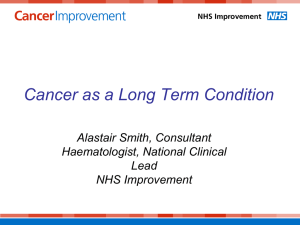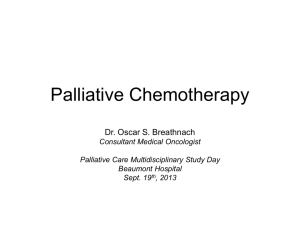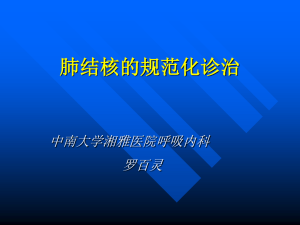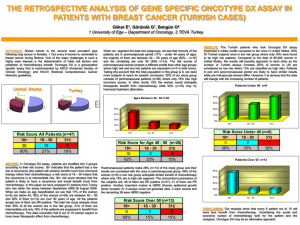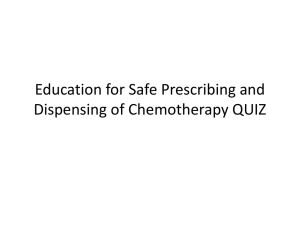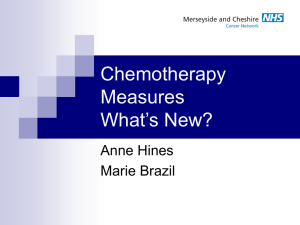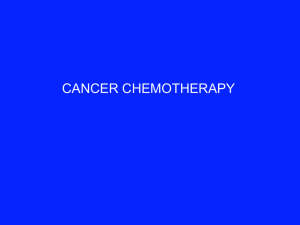to view the facts about oral chemotherapy parity
advertisement
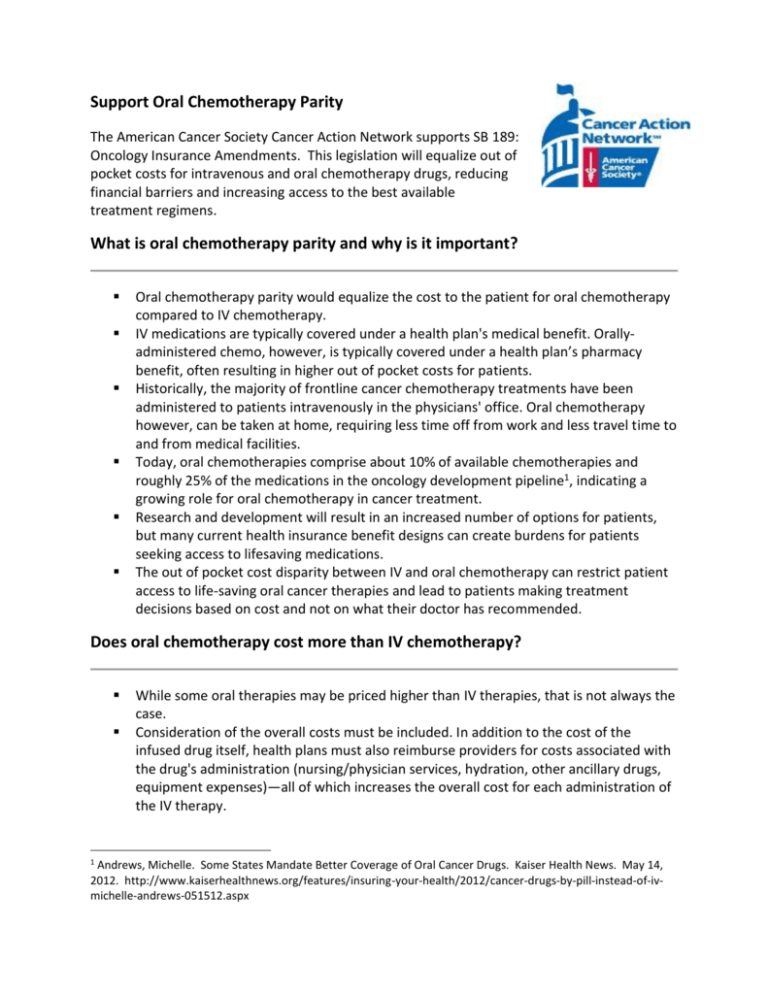
Support Oral Chemotherapy Parity The American Cancer Society Cancer Action Network supports SB 189: Oncology Insurance Amendments. This legislation will equalize out of pocket costs for intravenous and oral chemotherapy drugs, reducing financial barriers and increasing access to the best available treatment regimens. What is oral chemotherapy parity and why is it important? Oral chemotherapy parity would equalize the cost to the patient for oral chemotherapy compared to IV chemotherapy. IV medications are typically covered under a health plan's medical benefit. Orallyadministered chemo, however, is typically covered under a health plan’s pharmacy benefit, often resulting in higher out of pocket costs for patients. Historically, the majority of frontline cancer chemotherapy treatments have been administered to patients intravenously in the physicians' office. Oral chemotherapy however, can be taken at home, requiring less time off from work and less travel time to and from medical facilities. Today, oral chemotherapies comprise about 10% of available chemotherapies and roughly 25% of the medications in the oncology development pipeline1, indicating a growing role for oral chemotherapy in cancer treatment. Research and development will result in an increased number of options for patients, but many current health insurance benefit designs can create burdens for patients seeking access to lifesaving medications. The out of pocket cost disparity between IV and oral chemotherapy can restrict patient access to life-saving oral cancer therapies and lead to patients making treatment decisions based on cost and not on what their doctor has recommended. Does oral chemotherapy cost more than IV chemotherapy? 1 While some oral therapies may be priced higher than IV therapies, that is not always the case. Consideration of the overall costs must be included. In addition to the cost of the infused drug itself, health plans must also reimburse providers for costs associated with the drug's administration (nursing/physician services, hydration, other ancillary drugs, equipment expenses)—all of which increases the overall cost for each administration of the IV therapy. Andrews, Michelle. Some States Mandate Better Coverage of Oral Cancer Drugs. Kaiser Health News. May 14, 2012. http://www.kaiserhealthnews.org/features/insuring-your-health/2012/cancer-drugs-by-pill-instead-of-ivmichelle-andrews-051512.aspx Comparing only the cost of the drugs alone represents only one portion of the overall cost question. Is this legislation a mandate on insurance companies? Senate Bill 189 does not mandate coverage of oral or IV chemotherapy. The bill, which applies to health benefit plans renewed or entered into after July 1, 2013, states that “a health benefit plan that covers prescribed oral chemotherapy and intravenously administered chemotherapy shall ensure that the cost sharing and treatment limitations applicable to the covered oral chemotherapy are no more restrictive than the cost sharing and treatment limitations applied to the covered intravenously administered chemotherapy. “ This bill does not mandate coverage, it simply establish parity in patients' out of pocket costs. Impact on Insurance Premiums There is no evidence that this legislation has increased health insurance premiums in states with similar laws in effect. A pre-implementation study (conducted by Vermont’s Department of Banking, Insurance, Securities and Health Care Administration) found that the states which had passed the laws reported, at most, a "negligible" impact on insurance rates. 2 Both the Oregon Department of Consumer & Business Services and the Indiana Department of Insurance have stated that there is no evidence that implementation of the states' oral chemo access laws has increased health insurance premiums.3 A study conducted for the New Hampshire Insurance Department estimated that similar legislation in that state would increase premiums by .003% to .020% on average. 4 Talking Points 2 ACS CAN is asking all legislators to support SB 189. Individuals with insurance plans that require patients to pay a certain percentage of prescription drug costs could decide to forgo treatment all together because of financial barriers, or could choose another more affordable treatment option, despite their doctor’s recommendations. American Cancer Society Fact Sheet. American Cancer Society Fact Sheet. 4 Actuarial Assessment of the Report of the Committee to Evaluate Parity between Oral and Intravenous Chemotherapy. Prepared by Compass Health Analytics, Inc. for the State of New Hampshire Insurance Department. August 9, 2012. 3 Oral chemotherapy can be taken at home, reducing the amount of time a patient spends traveling to and from a doctor’s office and the time they spend in the office receiving treatment. SB 189 is not a coverage mandate on insurance companies. The bill simply creates parity should insurance companies choose to cover both IV and oral chemotherapy agents. In those states with similar legislation, the insurance premium increase has shown to be negligible.
